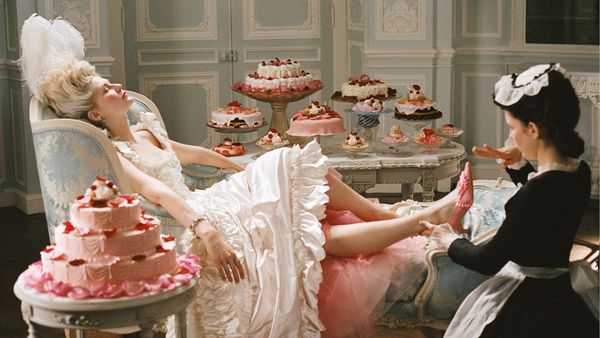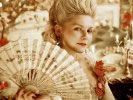Eye For Film >> Movies >> Marie Antoinette (2006) Film Review
Marie Antoinette
Reviewed by: Chris

If we are to believe the feminist line of one of Alan Bennett's characters that history is the story of man's inadequate responses, told from the viewpoint of other men, how would a female auteur approach a film about one of the most vibrant and controversial women in French history? Not in a way that is to everyone's liking, that's for sure.
Marie Antoinette, a teenage Austrian princess, was married to Louis XVI, in part to ratify a treaty between their two countries. She lived with him until Robespierre's mob did away with them both during the bloody years of revolution.

There are more than enough scandalous headlines and turning-points-in-history in her life to make a colourful epic, or sufficient salaciousness for a hearty romp. While both these approaches are stock-in-trade and justifiable, the initial scenes of Sofia Coppola's film suggest we are in for nothing of the sort.
Bright pink opening credits catapult us into 1768 Austria with an intrusive girliness, reminiscent of a retro pop video. They soon give way to pleasant pastels, where even the horses gallop through woods in soft focus, and a feminine intellectual assertiveness that indicates this will be no re-telling of a man's take on history. The facts, while not exactly misrepresented, are definitely going to be subordinate to the artist's vision.
For the talented Kirsten Dunst, Antoinette is the most challenging role of her career. The movie hangs on her, yet she delivers Coppola's interiorised vision with charisma and remarkable aplomb. We see her escorted to a foreign land and completely isolated. Her clothes, her dog - everything - is taken away, so that she has only that which is "completely French." We see her suffer the glare of publicity, even around the marriage bed, and witness the guilt she feels at not becoming pregnant soon enough. We see her searching inside for something to cling on to, while surrounded by vast, indulgent opulence. And the requisite public persona cannot admit unhappiness.
She is envenomed at the openness with which a prostitute is allowed to flirt in court, while, at the same time, feels that she is little more than a "piece of meat," traded for politics and progeny. Bereft of privacy, she is not allowed to be herself, on top of which she doesn't have a whore's tricks-of-the-trade to get her inexperienced husband to consummate the marriage.
Female isolation and viable escapes have been the subjects of Coppola's earlier films. In her debut, The Virgin Suicides, they led to tragedy and in the Oscar-winning Lost In Translation, Scarlett Johansson asks really important life questions and escapes the rat race (almost) with a man she thus inspires.
In the latest, Antoinette withdraws to the country, gets in touch with nature and her artistic sensibilities, as well as learning the business of rearing of a child, who, against the odds, finally makes an appearance. This second phase allows a warmth and intimacy, lacking at Versailles, to flourish.
Louis, meanwhile, continues his war games, lending soldiers to help the American War of Independence, mostly to spite the English, even though the people of France are starving. The couple are still young when they ascend the throne and have little awareness of how to protect their interests and even less of how to govern. The fawning rituals, maintained by the courtiers, unwittingly trap them in hubris not of their own making. Yet, in a way, they are also precursors of the people's anger, enjoying the true magnificence of the French court, as the seeds of its destruction are sown. Antoinette longs for a more real life, while Louis publicly supports a revolution on the other side of the Atlantic.
Artwork, scenery and costumes are to die for. With unparalleled access to the Palace of Versailles and everything shot on location in France, Coppola has spared little to convey an authentic vision, which owes more to Warhol than to Rembrandt. Pop art is employed almost throughout, in a fearless, accessible and enjoyable way, from a masked ball overlaid with Siouxie And The Banshee's Hong Kong Garden ("Junk floats on polluted water, an old custom to sell your daughter") to posters with slogans vilifying Antoinette's supposed excesses and the reintroduction of paintings, from which successive infants disappear to indicate early deaths.
There is no attempt to disguise American, or British, accents, as Coppola goes beyond historical verisimilitude. At one point, Antoinette's happiness becomes real and she sweeps the crowd along, as she breaks with tradition to applaud a grand opera. Later, we see her on a balcony alone, with the darkness of the room behind. The camera pans back to show the vastness of the palace around her, empty of all other signs of life. Here, she is like a captured bird in a gilded cage.
During the great bread shortages, when she was mistakenly quoted as saying, "Let them eat cake," we see that everything around her has been misrepresented from the start. "She looks like a little piece of cake," is how her youthfulness was expressed on entering France (and disrobing to comply with tradition). Her innocence is dismissed as trivial and her ideals as unsophisticated.
No one does rich-little-misunderstood-girl quite like Coppola.
Building up through two first acts of eye candy, the coda comes as a slap in the face. Suddenly, gone are the pop music and the Mozart. Say hello to stark reality.
It is not too difficult to find modern analogies, whether they are Iran, or the United States. How many people have to starve before the boys in the front room stop playing war with such smug self-satisfaction? Is the vision of the artist, or even the child and its mother, a less viable view of the world?
Marie Antoinette can be seen as a cutting feminist diatribe, or the work of a director, who views the universe and all its contradictions as nothing more than her artist's palette. There is a similarity to Brian De Palma's The Black Dahlia in that it thumbs its nose at what the audience expects, with ingenious lighting and idiosyncratic revelations.
Coppola's quirky, sugary and sympathetic tone may upset traditionalists, while others might find it flippant. A film that ignores incarceration and the guillotine in favour of subtle emotional resonance and gender imbalances will make a lot of people ask if the director has missed the plot. But for someone who pits herself against a male-orientated view of the world, she acquits herself quite admirably - and not just with girlish charm.
Marie Antoinette goes beyond its individual example in French history and becomes the hope of a nation, hidden in that which is most despised.
Reviewed on: 28 Oct 2006

















